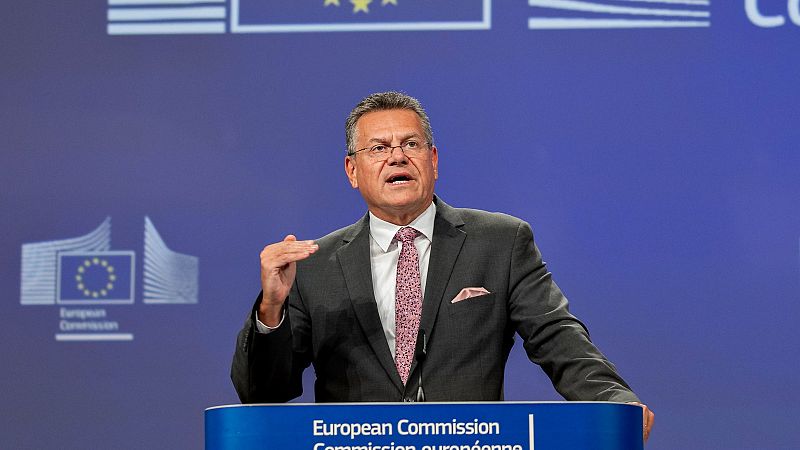Brussels defiant against persistent criticism of EU-US trade deal

The European Commission continues to fiercely defend its trade deal with the United States amid increasingly loud criticism from members of the European Parliament and fresh tariff threats from Donald Trump casting doubt over the agreement's viability.
"Tell me, who got a better deal than the European Union? Just tell me. I would like to read it. Show me," Maroš Šefčovič, the Commissioner for trade, said defiantly on Wednesday.
Under the deal, which is already in effect, the vast majority of EU-made goods bound for the US market are subject to a 15% tariff, while the vast majority of US-made goods bound for the EU market are exempt from duties.
A select group of products, such as aircraft, critical raw materials and semiconductor equipment, benefits from a "zero-for-zero" scheme. Brussels, however, has failed to convince Washington to include wines and spirits, a strategic sector for Europeans.
Additionally, the bloc has committed to spending $750 billion on American energy, investing $600 billion in the American economy and buying $40 billion worth of American AI chips by the end of Trump's mandate. The US did not make any similar pledges.
Since the terms were announced in late July, the Commission has been battling an avalanche of recriminations and accusations that seem nowhere near subsiding.
At a hearing of the Parliament's trade committee on Wednesday, MEPs vented their frustration over the agreement's lopsided nature, depicting the result as a capitulation to Trump's maximalism that endangers the bloc's pursuit of strategic autonomy.
The fierce opposition risks complicating the passage of the legislation that the Commission has introduced to remove the remaining tariffs on US products. In return, the US is meant to lower rates on EU cars from 27% to 15%, which has yet to happen.
"I had hoped for a European moment," said Anna Cavazzini, a German member of the Greens. "The deal is quite bad, unbalanced, not only when it comes to the different tariff lines, but also when it comes to increasing our dependency on fossil fuels," she said.
Rihards Kols, from the European Conservatives and Reformists (ECR) group, attacked the deal for being overtly "vague" and "flexible" and for "lacking enforceability".
"We need to draw a red line to what we can expect when it comes to transatlantic relationships," said Karin Karlsbro, a Swedish liberal. "How can we ensure that enough is enough (and) that the deal actually delivers on what it intends to do?"
Cornered by lawmakers, Sabine Weyand, the director general of the Commission's trade department (DG Trade), contended that America's commercial policy was beyond European control and that her team had been left with little room for manoeuvre.
"Confronted with the Trump administration that is determined to use tariffs as an instrument to pursue various policy objectives, the question for us is how we best defend EU interests," she said. "That's what we have tried to do (and) we have succeeded."
Weyand recalled how the Commission had begun the talks by offering a zero-for-zero scheme for all industrial goods. That pitch, though, fell flat with the White House.
"At some stage, you have to decide not to bang your head against the wall expecting the wall to move, but you have to see how you can lower the wall, reduce it, climb over it," Weyand said.
Big Tech pressure
Meanwhile, in a separate press conference, Commissioner Šefčovič, who personally led the negotiations, insisted the deal was "the only responsible way forward".
"A trade – and political – escalation would have served no one, except our global strategic rivals. Is that the outcome we want?" he asked.
His message of stability and predictability was dealt a heavy blow last week, when Trump, in an out-of-the-blue social media post, threatened to impose "substantial additional tariffs" on countries that enforce regulations on Big Tech.
"America, and American Technology Companies, are neither the 'piggy bank' nor the 'doormat' of the World any longer. Show respect to America and our amazing Tech Companies or, consider the consequences!" Trump wrote on Truth Social.
Trump's warning caught Brussels off guard and raised fears that the transatlantic trade war, which the deal was supposed to close, was about to be reignited.
Asked about the tariff threat, Šefčovič defended the EU's sovereign right to legislate but admitted the disagreements over digital oversight remain unresolved.
The Trump administration and the Republican Party have relentlessly denounced the bloc's tech rulebook, including the Digital Services Act (DSA), which is meant to combat illegal content and disinformation online; the Digital Markets Act (DMA), which aims to guarantee free and fair competition; and the Artificial Intelligence Act, which lays out rules for AI systems deemed risky for human safety and fundamental rights.
The US Congress has organised a hearing into the matter.
"The sovereignty of our legislative process and respect for our laws were always of paramount importance. And we've always been very, very clear about that with our US partners," Šefčovič said in a response to a Euronews question.
"We kept it out from our discussions. Will it come in the future? There are a lot of issues which will be coming in the future."
His comments come a day after MLex reported, citing Commission sources, that Šefčovič had intervened at the last minute to delay delivery of a fine against Google's dominance of advertising technology that the Commission had readied under the DMA.
Šefčovič neither denied nor confirmed the report, instead saying he "fully" supports the internal probe and the Commission's antitrust department.
"This is a complex case that requires a thorough assessment, and every step has been taken in a collegial manner," he said. "I can assure that my priority is, and always will be, in the European interest."
Today

